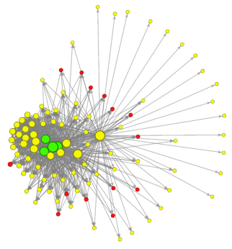 Back to projects
Back to projects

Mathematical modelling of evolution of heterogeneous viral populations organized into complex cross-immunoreactivity networks
- Download: N/A
- References: P. Skums, L. Bunimovich, Y. Khudyakov, Antigenic cooperation among intrahost HCV variants organized into a complex network of cross-immunoreactivity Proc Natl Acad Sci USA, 112 (21), 6653-6658
Hepatitis C virus (HCV) has propensity to cause chronic infection. Continuous immune escape has been proposed as a mechanism of intra-host viral evolution contributing to HCV persistence. Although the pronounced genetic diversity of intra-host HCV populations supports this hypothesis, recent observations of long-term persistence of individual HCV variants, negative selection increase and complex dynamics of viral subpopulations during infection as well as broad cross-immunoreactivity (CR) among variants are inconsistent with the immune-escape hypothesis.
We develop mathematical models of intra-host viral population dynamics under the condition of a complex CR-network (CRN) of viral variants and examine the contribution of CR to establishing persistent HCV infection. The model suggests a novel mechanism of viral adaptation by antigenic cooperation (AC), with immune responses against one variant protecting other variants. AC reduces the capacity of the host's immune system to neutralize certain viral variants. CRN structure determines specific roles for each viral variant in host adaptation, with variants eliciting broad-CR antibodies facilitating persistence of other variants immunoreacting with these antibodies. The proposed mechanism is supported by empirical observations of intra-host HCV evolution. Interference with AC is a potential strategy for interruption and prevention of chronic HCV infection.
